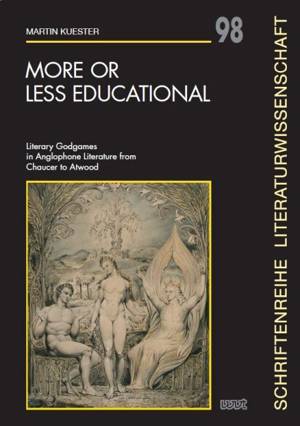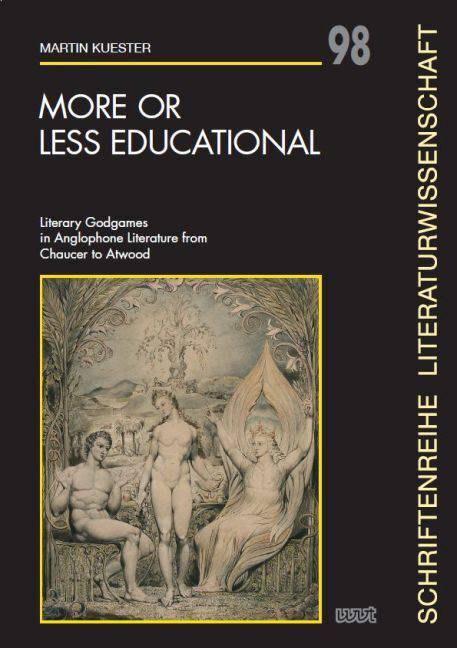
- Retrait gratuit dans votre magasin Club
- 7.000.000 titres dans notre catalogue
- Payer en toute sécurité
- Toujours un magasin près de chez vous
- Retrait gratuit dans votre magasin Club
- 7.000.000 titres dans notre catalogue
- Payer en toute sécurité
- Toujours un magasin près de chez vous
More or Less Educational
Literary Godgames in Anglophone Literature from Chaucer to Atwood
Martin Kuester
24,95 €
+ 49 points
Description
This volume brings together thoughts and ideas about "godgames" I gathered over many years and in various educational and academic contexts. The term godgame - or, most often, god game spelled in two words - appears quite regularly today in the context of computer games and science fiction and fantasy literature. What I want to show in this study is that such godgames, as defined by British novelist John Fowles, have existed for many centuries not only in the realm of fantasy literature and include many works that are central to the traditional literary canon(s). The godgame offers the chance of bringing together authors and works that have crept up at various points of my academic life and whose mention within the context of one single work of literary criticism might at first sight seem somewhat challenging: Chaucer's Canterbury Tales, Shakespeare's Measure for Measure and The Tempest, Milton's Paradise Lost, and nineteenth- and twentieth- or even twenty-first-century authors from North America and Britain such as Herman Melville, Margaret Atwood, Robert Kroetsch, Michael Innes and Ian McEwan - and films such as The Game (1997) and The Truman Show (1998), or even science fiction movies such as The Matrix.
CONTENTS
0. Preface1
1. Godgames - a Fascinating and not so New Topic4
2. The Prototypical Godgame Novel: John Fowles's The Magus8
3. Chaucerian Godgames in The Pardoner's Tale17
4. Shakespearian Godgames in Measure for Measure and The Tempest25
5. Miltonic Godgames from Comus to Paradise Lost36
6. Melvillean Godgames in The Confidence-Man48
7. Godgames in Michael Innes's Oxford (... and Elsinore)58
8. Ian McEwan's Godgames in Amsterdam and Machines Like Me66
9. Robert Kroetsch: Godgames of a Novelist, Teacher and Scholar74
10. Atwoodian Godgames: Oryx and Crake and Hag-Seed82
11. Godgames in Science Fiction, Horror Narratives and Film102
12. Stephen Scobie's Godgames in the Griffin's Wood113
13. Godgames and Brexit: Stanley Johnson et al.119
14. Being Taught and Teaching Through Godgames127
15. Works Cited131
CONTENTS
0. Preface1
1. Godgames - a Fascinating and not so New Topic4
2. The Prototypical Godgame Novel: John Fowles's The Magus8
3. Chaucerian Godgames in The Pardoner's Tale17
4. Shakespearian Godgames in Measure for Measure and The Tempest25
5. Miltonic Godgames from Comus to Paradise Lost36
6. Melvillean Godgames in The Confidence-Man48
7. Godgames in Michael Innes's Oxford (... and Elsinore)58
8. Ian McEwan's Godgames in Amsterdam and Machines Like Me66
9. Robert Kroetsch: Godgames of a Novelist, Teacher and Scholar74
10. Atwoodian Godgames: Oryx and Crake and Hag-Seed82
11. Godgames in Science Fiction, Horror Narratives and Film102
12. Stephen Scobie's Godgames in the Griffin's Wood113
13. Godgames and Brexit: Stanley Johnson et al.119
14. Being Taught and Teaching Through Godgames127
15. Works Cited131
Spécifications
Parties prenantes
- Auteur(s) :
- Editeur:
Contenu
- Nombre de pages :
- 150
- Langue:
- Anglais
- Collection :
- Tome:
- n° 98
Caractéristiques
- EAN:
- 9783868219722
- Date de parution :
- 27-01-23
- Format:
- Livre broché
- Dimensions :
- 156 mm x 10 mm
- Poids :
- 289 g







